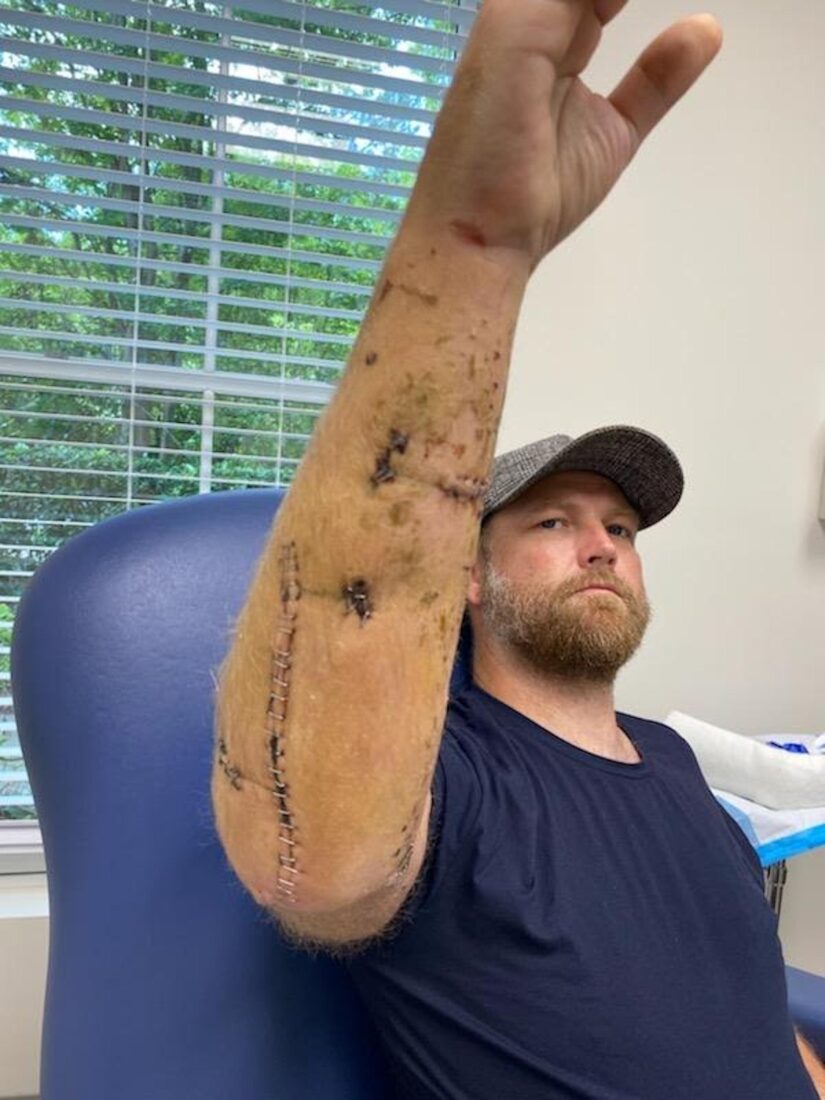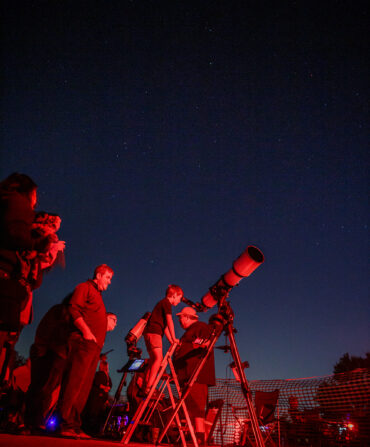On April 15, the unthinkable happened to Charleston resident Will Georgitis as he was scuba diving in the Cooper River: A huge alligator attacked him when he surfaced, taking him all the way to the bottom of the waterway, where he fought for his life on an empty tank of oxygen. After narrowly escaping by wrapping his arms around the gator, stabbing its eye with a screwdriver, and pushing up from the river bottom while ripping his arm out of its mouth, Georgitis feels lucky to be alive.

But his story actually starts five years earlier, when he started shopping online for a fossil, which he thought would make a unique gift for his sister. “In the descriptions of them, almost all of them said they were found in Charleston. I thought, what am I doing looking to buy one of these? I need to just go find them,” Georgitis remembers. He went out in a kayak with a friend to fish and look for shark teeth along beaches, and was immediately hooked. He went back again the next day. “I just left my fishing rod in the boat,” he says. “I realized right there I was addicted. I found my first [megalodon tooth] within a month.”
Soon enough, he had started scuba diving in rivers, attending gem and mineral shows, and participating in the fossil trade. (See some of his finds on his Instagram page, @voodoofossils84.) “I love it so much that I quit my job, and that’s all I do now, I just sell fossils,” Georgitis says. That’s right, sells—present tense. Below, we caught up with him on the the attack, why he loves what he does so much, and his safety tips for other divers.
What is it like when you’re diving in these rivers?
It’s mind-blowing what’s really out there. You get to be inside of the coolest-looking aquarium you could ever imagine. Every river’s got a different character to it when you get down to the bottom. Some rush really fast, some are slow and meandering, some are algae-covered, some are covered in barnacles. I go to different places just to get certain types of teeth, depending what I want—megs or Angustidens or great whites. It’s the closest I could ever be to feeling like what an astronaut would feel like flying through outer space. Diving in the rivers, you feel weightless, and you’re in a world you don’t belong in. You get to forget the entire world above you when you’re down there. It’s beautiful.
What are some of the things you’ve seen?
There’s all kinds of artifacts from all of American history. There’s pre-colonial Native American artifacts from 13,000 years ago all the way up to more modern Native American stuff. And then it transitions into colonial bottles and glassware and pottery, Civil War buckles and buttons and musket balls. And then on top of all that, you’ve got millions of years of fossils laying down there. There is amazing history in these waters.
You go along these gravel bed edges and there are teeth in them. Sometimes it’ll be two megalodons or three megalodons just lying on top of each other. Some of them are loose, out in the open, and some of them are stuck. I’ve come across whole animals stuck into the bottom of the matrix, just like you would see in a museum. I always find something when I go out.
Was the spot where you were attacked somewhere you go often?
It’s funny, I hadn’t actually gone to this spot since I started diving three or four years ago. I go back to reminisce and sure enough, get snapped.
How is the recovery going?
I’ve had some complications. My arm is still pretty torn up from the elbow down. There’s a big gash there where I ripped it out of the gator’s mouth. Then there’s a bunch of puncture holes all over the top of it, and another big gash where they cut me open and put the plates in.
Are you still in shock that this happened?
I’m even more in shock now. One of my friends knows somebody that has a gator skull, and they said it was from a ten-foot gator they hunted themselves. They measured the lower jaw, which would have been what made the gashes on my arm. A ten-footer had just over four-inch wide teeth from left side to right side. My injury is over nine inches wide. This gator was probably more like a fourteen-footer, maybe bigger. It’s even scarier to think back on all of it. I’m still blown away that I was able to do anything that I did.
In the moment, did you have any time to be scared, or were you just in survival mode?
To be honest, I was absolutely terrified. I can’t even describe the speed as it was coming at me. It was going so fast that the only thing that was in the water was his tail and lower half. The rest of it was completely above the surface of the water, like it was hydroplaning. And then its girth was just immense…alligators are creatures to behold.
Some of my interviews make it sound like I was calm and collected and thoughtful. But I was screaming, thrashing, with thoughts running through my head of no, not this, not this. I had flashes of clarity. I realized through the whole struggle that I was pretty much a toy in this thing’s mouth.
How aware were you of this danger?
We all know there are gators out there. We see them all the time. Gators are not interested in humans; they see us as a threat and just leave people alone. I’m one of the few people that a gator has seen and chased down and attacked. Most of the time if they do any kind of chasing, it’s a territorial bluff. So they’ll come at you and then stop and wait to make sure you know they don’t want you coming any closer.
For this one to come after me and attack me like it did is an anomaly. So I wasn’t quite expecting it, but I wasn’t completely oblivious to it either. I’d sat up on the boat with my buddies half serious before, talking about what we’d do if a gator ever got us. We’d say, I’d do this and I’d do that. It was all just kind of a joke, but you know, those jokes were things that I did. I immediately wrapped up on it so it wouldn’t spin me. I went for the eye first.
What safety tips do you have now for other divers?
As a diver in general, you have to be ready for anything to go wrong. What do you do if your air stops falling? What do you do if this part of your gear breaks? What do you do if you get tangled in fishing line? You have to have a plan.
For gators, don’t go anywhere near the shores. Don’t present yourself as food, which is kind of what I did. I’ve heard some fishermen talking, and they said that there’s a lot of wild pigs going back and forth across that part of the river. I probably looked just like one. I should have gone a little farther away from the shore before I came up. I was already thirty or forty feet, but you just have to be double cautious even after you feel like you’re already in the safe zone.
Just try not to be overly confident in your skills. There are so many factors that are out of your control, so if anything is under your control, you just have to be super vigilant. I would hope most divers will think twice about what they’d do in this situation, especially now that this story is out there.
Okay, the million dollar question. Are you going to keep diving?
I’m so addicted to it. It’s my business, too. I just want to get back in the water. But I’m not just going to jump back in. I’m going to timidly dip my toes back into diving and go to places I know for sure don’t have gators. At first, I’ll just do quick, short dives to see if I can get through the PTSD I know I’m going to have. Fear is a good thing in a way; we feel that emotion for a reason. It’s a tool I’m going to add to my bill.
It’s going to be a long road of getting back into diving like I was fully before, but I still can’t give it up. It’s the best job ever. Obviously, I’m willing to risk my life for it.
A friend set up an account to help Georgitis with his medical bills. See details here—or buy a fossil from Georgitis through his Instagram account.
Lindsey Liles joined Garden & Gun in 2020 after completing a master’s in literature in Scotland and a Fulbright grant in Brazil. The Arkansas native is G&G’s digital reporter, covering all aspects of the South, and she especially enjoys putting her biology background to use by writing about wildlife and conservation. She lives on Johns Island, South Carolina.








